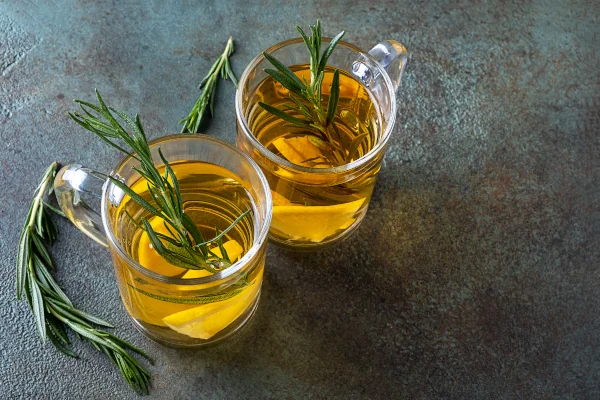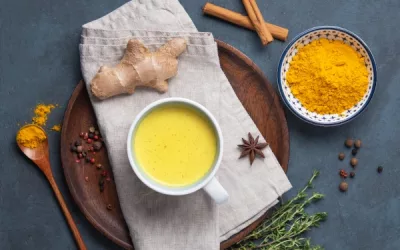Have you ever wondered how a simple herb can transform your health? Rosemary tea, with its rich history and potent properties, offers a myriad of benefits that are both fascinating and beneficial. In today’s bustling world, finding natural remedies to enhance well-being is more crucial than ever. This guide dives into the remarkable advantages of rosemary tea, from improving cognitive function to aiding digestion, while also providing practical preparation tips. Join me in exploring how this humble brew can elevate your health and culinary experiences!
In ancient Greece, rosemary was revered for its medicinal properties. Scholars often adorned themselves with rosemary garlands, believing it would enhance their memory. This tradition underscores the historical significance of rosemary in promoting cognitive health, a benefit we continue to appreciate today.
When I first started exploring herbal teas, rosemary tea quickly became a favourite. Its refreshing taste and soothing aroma made it a perfect companion during stressful days.
Over time, I noticed a remarkable improvement in my focus and a significant reduction in stress levels. Rosemary tea has since become a staple in my daily routine, offering both comfort and a mindful boost to my well-being.

How can you prepare rosemary tea at home?
Making rosemary tea at home is a simple and rewarding process. This herbal tea has a soothing aroma and a unique, pine-like flavour. It’s popular among health-conscious individuals and wellness enthusiasts. You can easily make it using fresh or dried rosemary.
Below, you’ll find a detailed table that outlines the ingredients, preparation steps, variations, serving suggestions, and storage tips for rosemary tea. This table will help guide you through the entire process.
Each row provides a specific tip or method to enhance your tea-making experience.
| Ingredients | Preparation Steps | Variations | Serving Suggestions | Storage Tips |
|---|---|---|---|---|
| Fresh rosemary sprigs | 1. Boil water in a kettle or pot. | Add a slice of lemon or lime | Serve hot with a slice of lemon | Store leftover tea in the fridge for up to 3 days |
| Dried rosemary leaves | 2. Place rosemary (1-2 tsp dried or 2-3 fresh sprigs) in a cup. | Infuse with mint leaves | Enjoy cold over ice on a hot day | Keep dried rosemary in an airtight container |
| Water (filtered) | 3. Pour hot water over the rosemary. | Combine with green tea leaves | Sweeten with honey | Fresh rosemary should be stored in the fridge |
| Optional sweeteners (honey, sugar) | 4. Let it steep for 5-7 minutes. | Use a cinnamon stick | Add a dash of fresh ginger | Dried rosemary can be stored for several months |
| Lemon or lime slices | 5. Strain the tea into another cup. | Infuse with lavender flowers | Serve with a dollop of whipped cream | Ensure no moisture gets into the container |
| Mint leaves | 6. Add your preferred sweeteners and enjoy. | Use a blend of rosemary and chamomile | Serve with a biscuit or piece of shortbread | Label the container with the date of purchase |
| Ginger pieces | 7. Experiment with variations as desired. | Mix with a hint of dried orange peel | Garnish with a rosemary sprig | Use a dark, cool storage location for dried herbs |
The table above provides you with everything you need to make a delicious cup of rosemary tea.
What are the health benefits of rosemary tea?
Rosemary tea isn’t just tasty; it packs a punch when it comes to health benefits. Drinking this tea can improve your overall well-being, thanks to its numerous beneficial properties.
- Boosts memory and concentration: Rosemary contains compounds that can enhance cognitive function.
- Relieves stress: The aroma of rosemary has calming effects on your nervous system.
- Eases digestion: This tea can help alleviate bloating and other digestive issues.
- Rich in antioxidants: Rosemary is full of antioxidants that combat free radicals in your body.
- Anti-inflammatory properties: Drinking rosemary tea can reduce inflammation, easing symptoms of conditions like arthritis.
These health benefits make rosemary tea an excellent choice for those looking to improve their health naturally. It’s a simple, delicious way to incorporate more wellness into your daily routine.
Are there any side effects of drinking rosemary tea?
While rosemary tea offers many health benefits, it’s important to be aware of potential side effects.
- Allergic reactions: Some people may experience allergic reactions to rosemary.
- Blood pressure issues: High doses of rosemary might affect blood pressure.
- Pregnancy concerns: Pregnant women should consult a doctor before consuming rosemary tea.
- Medication interactions: Rosemary may interact with certain medications, such as blood thinners.
- Gastrointestinal discomfort: Consuming large quantities may lead to stomach upset.
- If you experience any adverse effects, it’s best to stop drinking the tea and consult a healthcare provider. Always consume in moderation to avoid potential side effects.
Rosemary tea can be a delightful addition to your beverage repertoire but, like any natural remedy, it should be enjoyed responsibly.
Back in ancient Greece, students used rosemary sprigs to improve their memory while studying for exams. The herb was so revered that it was often used in ceremonies and rituals to promote mental clarity.
Its reputation for enhancing cognitive function has persisted through the ages, proving that sometimes, ancient wisdom holds true even in modern times.
I remember the first time I made rosemary tea after a long day at work. The scent of rosemary filled my kitchen, creating an instant sense of calm. After a few sips, I felt noticeably more relaxed and focused.
Now, it’s my go-to beverage for unwinding in the evenings.
What are the culinary uses of rosemary tea?
Using rosemary tea in your kitchen isn’t just about concocting a beverage to sip when you’re feeling fancy. This aromatic infusion is a multi-tasking hero that can elevate sauces, infuse cocktails, and even sneak its way into desserts. Imagine the fragrant delight wafting through your home as rosemary tea works its magic.
Before you know it, you’ll be thinking of ways to slip it into every recipe, just for that scintillating touch of herbal charm. Let’s explore how rosemary tea can transform your culinary ventures and earn you some serious kitchen cred.
What dishes pair well with rosemary tea?
Excited about introducing rosemary tea into your meals? Let’s dive into what dishes this infusion complements so seamlessly that you might feel like a culinary wizard.
- Roast chicken: Rosemary tea acts as a delightful baste, infusing the bird with a hint of herbal goodness.
- Lamb dishes: The robust flavour of rosemary tea perfectly counterbalances the richness of lamb.
- Vegetable medleys: Enhance your veggies with a spritz of rosemary tea for a refreshing twist.
- Hearty soups: Add a splash of rosemary tea to give your soups an aromatic depth.
- Mediterranean cuisine: From hummus to olives, rosemary tea enriches quintessential Mediterranean dishes.
Standing in your kitchen, contemplating your next move, why not pour a bit of rosemary tea into your roast chicken or lamb marinade? Elevate your vegetable dishes with a hint of herbal zest – your taste buds will thank you.
Can rosemary tea be used in cooking or baking?
Absolutely, rosemary tea isn’t just for sipping! This versatile brew finds its way into both cooking and baking, promising to elevate a variety of recipes.
- Marinades: Use rosemary tea as a base for marinating meats, enhancing the flavours.
- Doughs and batters: Incorporate it into bread dough or batter to infuse a subtle herbaceous note.
- Steamed dishes: Steam your veggies or fish with rosemary tea for a delightful twist.
- Sauces and gravies: Swap out water or stock for rosemary tea to add depth.
- Rice and grains: Cook rice, quinoa, or couscous with rosemary tea for a fragrant finish.
From the kitchen counter, imagine the possibilities: marinating a chicken with a concoction of rosemary tea and olive oil, mixing it into your bread dough, or even steaming some fish with it. Each splash promises a taste revolution!
What are some unique recipes that use rosemary tea?
Ready for a bit of kitchen creativity? Here are some unique recipes where rosemary tea shines:
- Rosemary tea lemonade: Mix rosemary tea with lemonade for a refreshing, herbal drink.
- Herbal butter: Infuse butter with rosemary tea for a spread that’s perfect on toast or roasted meats.
- Rosemary tea sorbet: A palate-cleansing sorbet that makes the most of rosemary tea’s subtle flavour.
- Infused honey: Combine rosemary tea with honey for a sweet, aromatic spread.
- Cocktail mixer: Use rosemary tea as a base for gin or vodka cocktails for an unexpected twist.
Now you’re picturing whipping up a rosemary tea lemonade for a summer’s day or perhaps a rosemary-infused butter to melt over a steak. Maybe even a cocktail for Saturday night made lively with rosemary tea. Each of these recipes brings out the best in this multifaceted brew.
Back in the day, during the 1960s, the Beatles’ George Harrison was an avid lover of herbal tea and became fascinated with rosemary. While there’s no public record of him infusing rosemary directly into a pot of tea, he was known for exploring various herbal blends to promote well-being. Imagine him sitting in his lush garden, a steaming cup of rosemary brew in hand as he strummed his guitar, finding inspiration in every sip.
Integrate rosemary tea into your recipes, and you might just feel like a rock star in the kitchen – because who doesn’t need a bit of herbal inspiration?
How should dried rosemary be stored for tea preparation?
Let’s cut to the chase—if you’re keeping dried rosemary for your delightful tea rituals, proper storage is non-negotiable. Ever found your favourite snack stale? Same principle. Incorrectly stored rosemary will lose its potency and flavour faster than you can say “cuppa.”
Proper storage keeps its aroma, taste, and health benefits intact. Ideal conditions? Dark, dry, and cool places—think pantry rather than windowsill. Use airtight containers, preferably glass, to keep moisture, light, and pests out. A mason jar with a tight seal works wonders. Additionally, oversee the shelf life; dried rosemary generally thrives for about one to three years if stored correctly. Look out for discoloration, loss of scent, or—yikes—mould to know it’s time for a trip to the bin.
How long can dried rosemary be stored?
If you’ve ever been baffled in the spice aisle, squinting at expiration dates, let’s make this simple. Properly stored dried rosemary has a pretty decent shelf life—about one to three years.
- Under ideal conditions: keeps its zing for up to three years.
- Best before: approximately one year for optimum flavour.
- Decreased potency: starts around the two-year mark but still usable.
The key? Always store it right to squeeze out every last bit of goodness.
What are the best containers for storing dried rosemary?
Your dried rosemary deserves to be treated like the culinary gem it is. Choosing the right storage container isn’t rocket science, but it’s vital.
- Airtight jars: Mason jars, my friend. Perfect for sealing in freshness.
- Glass over plastic: Glass containers do not impart any unwanted flavours.
- Dark-coloured jars: Keep light out to protect those delicate oils.
- Vacuum-sealed bags: If you’re a serious hoarder, these babies extend shelf life.
Schedule a jar-choosing party; your taste buds will thank you later.
What are the signs that dried rosemary has gone bad?
So, you think your rosemary might be past its prime? Time to put on your detective hat. Spoiled rosemary isn’t just tasteless; it can be harmful.
- Discoloration: If it’s faded to some ghastly shade of grey, it’s no good.
- Loss of scent: Good rosemary smells like a woodland wonderland; bad rosemary smells like, well, nothing.
- Pest activity: Any uninvited critters? Bin it. Immediately.
- Mould: If you even suspect mould, it’s a hard no. Health isn’t worth compromised spices.
Keep your senses sharp; they’re your best tools in this preservation game.
Once, during the 16th century, Paracelsus, a Swiss physician and alchemist, declared that “All that man needs for health and healing has been provided by God in nature… the challenge of science is to find it.” He was an early advocate for natural remedies, touting the benefits of various herbs, including—yep, you guessed it—rosemary. Perhaps next time you sip your perfectly stored rosemary tea, you’ll think of Paracelsus, and toast to the timeless wisdom of natural healing.
What variations of rosemary tea can be made?
Alright, you’re curious about jazzing up your regular cup of rosemary tea, aren’t you? The beauty of rosemary tea is its versatility. We can’t simply drink the same thing over and over—variety is, after all, the spice of life! Let’s dive into the world of rosemary tea and explore how you can make it sing with a few delightful twists.
What herbs or spices can be combined with rosemary for tea?
Ever heard of a tea with a kick? No, not just caffeine. Combining herbs and spices with rosemary tea can turn your regular cuppa into a mini exotic escape. Think of your teacup as a blank canvas and these additions as the colours:
- Mint: Fresh or dried mint leaves will add a refreshing coolness.
- Lavender: Combine rosemary with lavender for a calming effect.
- Lemon Verbena: Adds a citrusy zest that brightens the flavour.
- Ginger: A bit of ginger can give your tea a warming, spicy edge.
- Chamomile: Perfect for a soothing night-time tea.
Imagine you’re an alchemist blending these herbs – the possibilities are endless! Just remember, a little goes a long way.
How can I make an iced version of rosemary tea?
You’re thinking, “Why should I limit my rosemary tea experience to hot beverages?” Great thinking! Iced rosemary tea can be your summer’s best friend. Here’s the easy-peasy way:
- Brew: Start with a strong batch of hot rosemary tea. Use double the amount of rosemary you would for a hot cup to ensure the flavour stands out when iced.
- Sweeten: Add honey or sugar while it’s hot so it dissolves well.
- Cool: Let it come to room temperature, then pop it in the fridge.
- Serve: Once chilled, pour over ice cubes and add a lemon slice or mint leaves for that extra zing.
Voilà, you now have a refreshing iced beverage that’ll keep you cool and impress your guests.
Are there any health benefits to adding other ingredients?
You might be wondering, “Is there more to these additions than just taste?” Absolutely. Each herb and spice you add isn’t just about making your taste buds do a happy dance; there are health perks too:
- Mint: Known for aiding digestion and soothing headaches.
- Lavender: Can help reduce anxiety and improve sleep.
- Ginger: Great for fighting nausea and reducing muscle pain.
- Lemon Verbena: Helps with digestion and can reduce stress.
- Chamomile: Famous for promoting relaxation and better sleep.
So, you’re not just getting a tasty upgrade, but also a health-conscious boost with every added ingredient.
The quest for tea perfection isn’t a modern pursuit. Ancient Egyptians believed that drinking herbal tea made from rosemary could enhance memory. In Medieval Europe, it was thought to ward off evil spirits. While we can’t promise it will make you a memory wizard or protect you from ghosts, adding a few herbs might just give you a new favourite brew.
Now that you’ve got the lowdown on spicing up your rosemary tea, it’s time to practice your newfound wizardry—grab those herbs and spices and make your teapot sing!
Conclusion
As I draw this exploration of rosemary tea to a close, I’m reminded of the myriad ways this humble herb can enhance our lives—from its remarkable health benefits to its versatility in our kitchens. Throughout the article, we discovered the powerful antioxidant properties and anti-inflammatory effects that make rosemary tea a supportive ally in managing blood sugar, enhancing cognitive function, and aiding digestion. It’s intriguing to think that a simple cup of tea can serve as both a soothing ritual and a potential remedy for our modern ailments.
What stood out to me most is the intersection of tradition and science. The historical uses of rosemary for stress relief align beautifully with contemporary findings on its mood-enhancing properties. This duality reflects the holistic approach to wellness many of us are seeking today, where mental and physical health are intricately connected. Additionally, the preparation of rosemary tea is accessible to everyone; even novice tea drinkers can easily infuse flavour and health into their daily routines.
Looking ahead, exploring the culinary uses of rosemary tea excites me the most. Considering how we can blend it with various herbs and integrate it into diverse recipes could open up a new realm of flavours and health benefits. I encourage you to experiment with rosemary tea in your cooking or try it in different variations to discover what resonates with your palate and health needs.
As you reflect on the insights shared here, I invite you to think about how herbal remedies like rosemary tea can weave into your wellness journey. Can a simple cup of tea become a mindful ritual in your daily routine? The next time you savour that aromatic brew, remember that with every sip, you’re not just enjoying a delightful flavour, but also nurturing your body and mind in profound ways. And as the saying goes, “Let food be thy medicine, and medicine be thy food.” Why not let rosemary tea be a comforting part of that philosophy?
Resources
- Rosemary Tea Consumption Alters Peripheral Anxiety and Depression Biomarkers: A Pilot Study in Limited Healthy Volunteers
- Cognition Enhancing Effect of Rosemary Plant (Rosmarinus officinalis, L) in Preclinical Studies: A Systematic Review and Meta-Analysis
- Antidiabetic Effects and Mechanisms of Rosemary (Rosmarinus officinalis): A Review
- Acute ingestion of rosemary water: Evidence of cognitive and mood enhancement
- Rosemary: An Overview of Potential Health Benefits
- Rosemary (Salvia rosmarinus): Health-promoting benefits and food applications







